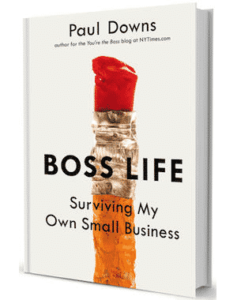Paul Downs on ‘Boss Life: Surviving My Own Small Business’
- Date: May 2016
- Bank balance: $146,651.86
- Cash relative to start of year “Net Cash”: $67,665
- New contract value, YTD: $1,031,096

Paul Downs, author of “BossLife: Surviving My Own Small Business” (Blue Rider Press), begins every chapter with the monthly financial updates from his custom furniture business during the tumultuous year of 2012.
It’s a literary device that provides a raw look at the business and testifies to the transparency and honesty of his story, which includes airing his shortcomings as he reveals the challenges of running a small business. Downs says he hopes other small business leaders can draw lessons from his experience and feel less isolated.
He started his company in 1986, fresh out of the University of Pennsylvania with an engineering degree. He’s now in his 30th year in building custom board room tables at his shop in Bridgeport, PA. But, Downs says, there were several brushes with disaster.
2012 was one of them.
It was a “slow-motion train wreck,” according to Downs. “Sales were collapsing, and the operations were, in many ways, a big mess… It took at least six months to sort out.”
Solid advice from peers
Despite having a business partner a few years back, Downs felt isolated. “Where can I get good advice?” he wrote. “This has been a problem for me from the start.”
In the quest for guidance, Downs accepted an invitation from Vistage Chair Ed Curry to explore a private CEO peer advisory group along with several other local business leaders. The wide range of opinions to be found on the board was particularly appealing.
“I’d become very suspicious of only one source of advice,” Downs says. “I liked that Ed had a huge range of experience and that you got a dozen viewpoints from people who were qualified to comment.”
One viewpoint from fellow group member Keith DiMarino prompted a critical shift in focus. DiMarino told Downs to stop lamenting outside forces. “It doesn’t matter what is happening in the world because you can’t control that. What you can control is yourself, and you have to do something. You can’t do nothing,” he said.
So Downs took action. On the advice of another CEO in his group, he hired a sales and marketing consultant to train him and his salespeople. The investment paid off. He also recognized and trained fresh talent who helped him fix operations, and made deeper changes to how he engaged his team in problem-solving.
Ultimately, Downs was able to avoid disaster and, as the financial numbers above attest, grow his business.
He says he has heard from hundreds of small business owners who read “Boss Life.” Two out of three have the same comment: “I thought I was the only one, and this book was so great because I realized somebody else has problems.”
Running a business can be isolating, he acknowledges, but no one’s troubles are unique. “Getting help is the key step.”


